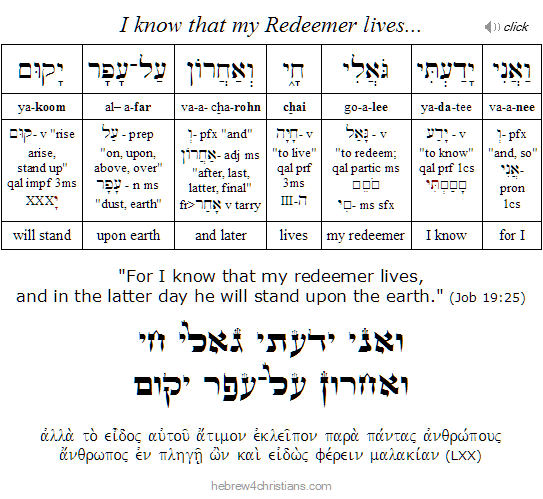|
Many of us walk through life in a state of denial over the ravages of time and the imminence of death. We catch glimpses only when we are jarred away from our everyday experiences, perhaps when we reencounter a long-forgotten friend or when someone we know gets terminally ill or dies.
Christians often recite Job's statement as an affirmation of God's ultimate redemption, though Job himself was seeking for vindication. He was a righteous man, after all, and he wrestled with his own personal exile in light of God's goodness and love.
Job appealed to God as his Go'el, or Redeemer. In the social laws of the Torah, the go'el was a near kinsman who was obliged to rescue his family from difficulty or danger (this is beautifully depicted by Boaz in the book of Ruth). However, Job's problem (as it is our own) is that such redemption (ge'ulah) means being liberated from the power of death itself. Job was in bondage to death and needed a Redeemer with the power to deliver him from the curse that hangs over the human condition.
The good news of redemption is that Jesus, who clothed Himself in the image and likeness of our dust (Rom. 8:3, Phil. 2:7), has rescued us from bondage to the "strong man" of death in order to restore us as the children of God. The Lord emptied Himself and suffered as our "Near Kinsman" – the Just for the unjust – as a ransom for our sinful condition (1 Pet. 3:18). God the Father vindicated Him by raising His body from the dust of death, thereby overcoming death's grip on humanity. Now the "dead shall live and their bodies shall rise from the dust" to sing for joy (Isa. 26:19). God ultimately vindicates His children in the celebration of Jesus' resurrected life. In the end, our flesh also shall rise to behold His glory. Amen.
|




